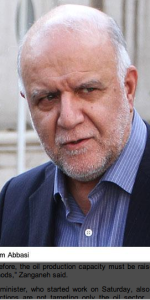
New Oil Minister Bijan Namdar-Zanganeh appeared Monday to threaten other exporters with a price war in order to get back Iran’s old share of the global oil market.
The apparent threat was buried in an interview Zanganeh gave to Shana, the Oil Ministry’s news service. Shana did not highlight the quote, however, so it wasn’t clear if Zanganeh meant it as a price war threat,
Most attention focused on Zanganeh’s statement that it was one of his priorities to boost Iran’s oil production capacity—capacity, not actual production—back to the level of 4.2 million barrels a day level that prevailed when Zanganeh left the Oil Ministry in 2005 at the end of President Mohammad Khatami’s last term of office.
But little attention was given to what Zanganeh said after that. “As we raise our production capacity, we have to think of marketing and selling our oil,” he said.
“Revival of Iran’s lost oil markets is among my top priority jobs,” Zanganeh said. Then he leveled the apparent threat. “We only ask those who have replaced us in the world’s oil markets to know that when we are re-entering these markets, they will have to accept that oil prices will decline—or they should reduce their production to create enough space for Iran’s oil.”
Zanganeh seemed to be asking other producers to cut their output so Iran could raise its sales from today’s 1.1 million barrels a day to the 2.5 million barrels that prevailed for two decades through 2011. And if others did not ratchet back their output, he appeared to be saying Iran would force its way back into markets by cutting its prices.
That would be an astounding threat. OPEC was created to try to drive prices up by limiting production. Now Zanganeh appeared to be playing the reverse game—threatening to drive prices down if other producers didn’t cut back on output.
But Zanganeh didn’t even hint how he thought Iran could do that. Iran’s market share has not been more than halved by market forces, but by sanctions. Europe didn’t stop all purchases of Iranian oil because it got a better price elsewhere but to throttle Iran over its nuclear recalcitrance. Dropping prices won’t prompt the EU to buy Iranian oil again.
Similarly, other countries reduced or halted buys of Iranian oil because of the pressures imposed by US and EU sanctions. The US sanctions are fairly straightforward; they essentially give other countries a choice—stop doing business with Iran or we will stop doing business with you. Given the size of the US market, that is not a difficult decision for very many countries. Iran’s offering price would have to be cut hugely to change the calculation for most countries.
Zanganeh was not blind to sanctions. He acknowledged in the interview that sanctions have driven down oil sales. As a result, he said, “we need to undertake measures to bolster our management and show to the enemies that the colonialists cannot speak to Iran in the language of sanctions.” But that didn’t explain how Zanganeh thought he could push oil sales back up. In fact, it really didn’t sound much different from the hostile rhetoric that the Ahmadi-nejad Administration resorted to constantly.
The Iranian media have not featured this price war threat.
Any cutting of oil prices would reverse what has been the public policy of the Ahmadi-nejad Administration, which always denied any willingness to cut prices to boost sales. However, there have been some contrary indications that the Ahmadi-nejad Administration actually did offer price cuts in efforts to boost sales in recent years, but without any major success.






















